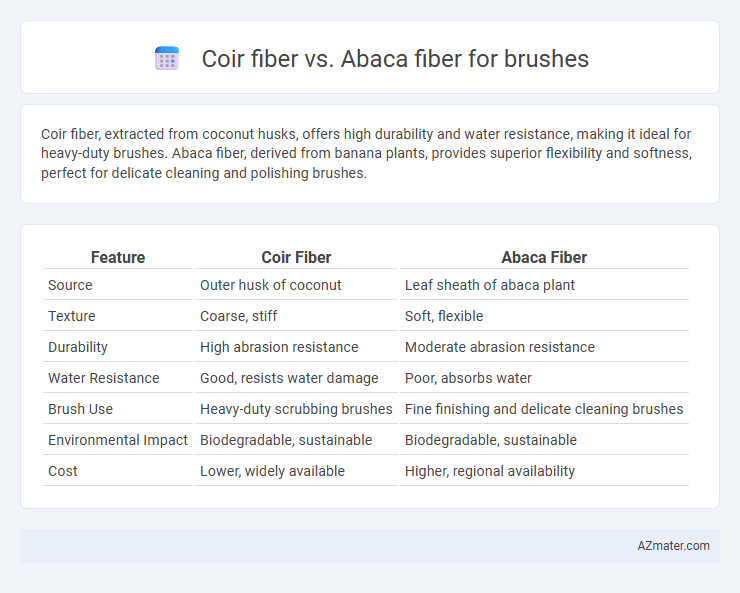Coir fiber, extracted from coconut husks, offers high durability and water resistance, making it ideal for heavy-duty brushes. Abaca fiber, derived from banana plants, provides superior flexibility and softness, perfect for delicate cleaning and polishing brushes.
Table of Comparison
| Feature | Coir Fiber | Abaca Fiber |
|---|---|---|
| Source | Outer husk of coconut | Leaf sheath of abaca plant |
| Texture | Coarse, stiff | Soft, flexible |
| Durability | High abrasion resistance | Moderate abrasion resistance |
| Water Resistance | Good, resists water damage | Poor, absorbs water |
| Brush Use | Heavy-duty scrubbing brushes | Fine finishing and delicate cleaning brushes |
| Environmental Impact | Biodegradable, sustainable | Biodegradable, sustainable |
| Cost | Lower, widely available | Higher, regional availability |
Introduction to Coir Fiber and Abaca Fiber
Coir fiber, derived from the outer husk of coconut shells, is renowned for its coarse texture, high durability, and natural water resistance, making it ideal for heavy-duty brush applications. Abaca fiber, extracted from the leaf stalks of the Abaca plant (Musa textilis), features superior strength, flexibility, and a softer feel, which enhances its suitability for fine and delicate brushing tasks. Both fibers are biodegradable and sustainable, offering eco-friendly alternatives with distinct physical properties tailored to specific brush manufacturing needs.
Origin and Source of Each Fiber
Coir fiber originates from the outer husk of coconuts primarily harvested in countries like India, Sri Lanka, and the Philippines, making it a durable and water-resistant material for brushes. Abaca fiber, derived from the leaf stalks of the abaca plant native to the Philippines, is renowned for its strength and flexibility, often used in specialty brushes requiring finer bristles. The distinct botanical sources and geographic origins of coir and abaca fibers contribute directly to their unique textures and suitability for different brush applications.
Physical Properties Comparison
Coir fiber, derived from coconut husks, exhibits high coarseness and durability with a coarse texture and high lignin content, making it resistant to abrasion and ideal for stiff brushes. Abaca fiber, sourced from the Musa textilis plant, is finer, more flexible, and has greater tensile strength due to its cellulose-rich structure, resulting in softer bristles suitable for delicate cleaning applications. Both fibers vary significantly in density and moisture resistance, with coir being denser and more water-resistant, while abaca offers superior flexibility and lighter weight for precision brushwork.
Durability and Longevity
Coir fiber, derived from coconut husks, exhibits superior durability and resistance to moisture, making it ideal for brushes exposed to wet environments. Abaca fiber, sourced from the banana plant, offers exceptional strength and flexibility but tends to wear faster under rigorous use. In terms of longevity, coir fibers generally outperform abaca fibers due to their hardness and resistance to fungal decay.
Water Resistance and Absorption
Coir fiber exhibits superior water resistance due to its high lignin content, making it ideal for brushes exposed to moisture and damp conditions. In contrast, Abaca fiber has higher absorption capacity, which allows it to retain water and cleaning agents effectively but may reduce its durability in wet environments. Choosing between Coir and Abaca fibers depends on the required balance between water resistance and absorption for specific brush applications.
Eco-Friendliness and Sustainability
Coir fiber, derived from coconut husks, is highly eco-friendly due to its natural biodegradability and renewable sourcing, making it a preferred choice for sustainable brush production. Abaca fiber, sourced from the Musa textilis plant, is also biodegradable and sustainably harvested but offers superior strength, ensuring longer brush lifespan and reduced waste. Both fibers support sustainable manufacturing, yet coir's widespread availability and lower environmental impact during harvesting make it particularly advantageous for eco-conscious brush makers.
Performance in Brush Manufacturing
Coir fiber offers excellent abrasion resistance and durability, making it ideal for heavy-duty brush manufacturing where toughness is essential. Abaca fiber exhibits superior flexibility and water absorption, allowing brushes to perform well in wet conditions and detailed cleaning tasks. The choice between coir and abaca fibers depends on the brush's intended application, with coir favored for rough scrubbing and abaca preferred for precision and moisture-sensitive environments.
Cost and Availability
Coir fiber, derived from coconut husks, is more cost-effective and widely available globally due to the extensive coconut production in tropical regions. Abaca fiber, obtained from the banana plant native to the Philippines, tends to be pricier and less accessible because of its limited growing areas and slower harvesting cycles. The choice between coir and abaca fibers for brushes primarily depends on budget constraints and the geographic availability of raw materials.
Common Applications in Brushes
Coir fiber, derived from coconut husks, is widely used in brushes for heavy-duty scrubbing and floor cleaning due to its stiffness and abrasion resistance. Abaca fiber, sourced from the abaca plant, is preferred in brushes for delicate surfaces and fine dusting because of its softness and flexibility. Both fibers offer eco-friendly alternatives, with coir dominating outdoor and industrial brushes while abaca excels in household and cosmetic brush applications.
Choosing the Right Fiber for Brushes
Coir fiber offers durability and water resistance, making it ideal for heavy-duty scrubbing brushes, while Abaca fiber provides superior softness and flexibility suitable for delicate surfaces. Choosing the right fiber depends on the brush's intended application; Coir fibers excel in outdoor and industrial use, whereas Abaca fibers are preferred for gentle cleaning and polishing tasks. Evaluating fiber strength, abrasion resistance, and natural stiffness ensures optimal performance and longevity in brush manufacturing.

Infographic: Coir fiber vs Abaca fiber for Brush
 azmater.com
azmater.com